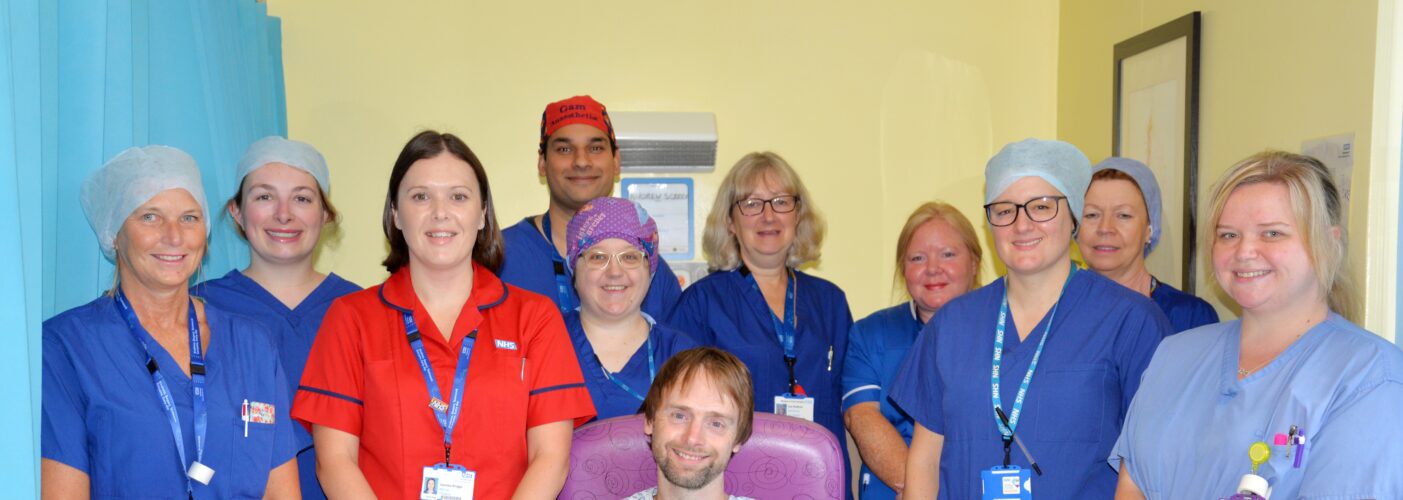
Spotlight
MPH surgeon performs UK first closure of ileostomy as a day surgery
Patients who have received treatment for rectal cancer surgery at Musgrove Park Hospital are now able to have their closure of ileostomy surgery - a small procedure performed when they no longer need a stoma – without a stay in hospital, which previously could have lasted up to a week.
We are the first trust in England to offer this procedure as a day surgery, with patients able to return home under the care of our acute home treatment team (Hospital at Home).
During colorectal surgery, the patient’s small bowel is brought through an opening made in their stomach or abdomen, called an ileostomy, which creates the stoma. After surgery, the patient will wear a stoma bag or pouch for at least six weeks while their large bowel recovers after surgery.
The removal of this temporary stoma, called a ‘closure of ileostomy’, involves the bowel being joined back up, allowing the patient to regain a feeling of their normal self.
Miss Shelly Griffiths, one of our consultant colorectal surgeons who performed the first procedure, said she was proud that we are the first NHS trust in the country to offer this procedure as a day surgery, in what is the final step for most patients in their rectal cancer treatment.
“Compared with most surgery, the join created near the rectum during the procedure has a high risk of leaking, which is why we sometimes need to divert stools (poo) into a stoma while the join heals.
“Once we know that the join has healed, and if the patient has had post-operative chemotherapy, they are scheduled in to have their ileostomy closed – which means they no longer need a stoma.
“Traditionally a closure of ileostomy procedure involves a stay in hospital for up to five nights, but we’re the first trust in the country to offer this as a day surgery, where patients can come in for their procedure in the morning and are then able to go home later in the afternoon.
“Being able to recover in the comfort of their own home with everything they need is such a positive for our patients. It means they can get back to normal quicker too without being stuck in hospital.
“We know that our waiting times have increased during the COVID-19 pandemic and this is one of the ways that we’re working hard to bring them down.
“The patient will have been sent a home monitoring kit a few days before their surgery, which our acute home treatment team keeps a close eye on remotely – in the same way they’d be observed while in actual hospital.
“Through this monitoring system, our patients can take their own respiratory rates, pulse and blood pressure, which automatically appears on a system that our Somerset Primary Link (a hub for coordinating care) team monitors remotely for five days – the same length of time that they would have otherwise been in hospital.
“This team has regular contact with the patient about how they’re feeling – the normal type of questions that we’d ask during an in-hospital ward round.
“If there are any concerns flagged up during the monitoring, our Somerset Primary Link colleagues would telephone the patient and follow the necessary clinical actions, from reassurance or recalling them to hospital.
“As long as the patient is doing well after the standard five days, then they’d be discharged from the acute home treatment service, and they’d get the usual outpatient follow-up appointments in 6-8 weeks’ time.
“Our next steps include looking at what other surgeries we can start doing as a day case procedure with the help of our acute home treatment team.”
Dr Mike Walburn, a consultant anaesthetist and site director for Musgrove Park Hospital, said:
“The Hospital at Home programme is now allowing our surgical patients to recover in their own homes.
“Evidence shows us that this is truly better for patients’ recovery and rehabilitation, and feedback so far is that they love recovering in their own surroundings, and often do so more quickly.
“This is part of a wider project aiming to enable people to recover from a wide range of illnesses in their own home, who would previously have been in an acute hospital bed – over 1,000 patients have benefited from this so far.
“Not only is this better for our patients, but receiving treatment in their own homes is starting to free up beds for patients who can only receive their care in hospital.
“Remote monitoring is one way we can keep an eye on people’s recovery, but we also visit them in person to review their progress and provide some treatments which were previously only available in a hospital.”
Andy from Ilminster was one of the first patients to benefit from returning home the same day after this procedure. He said: “I’m so very glad that I went ahead with my day surgery reversal - Shelly and her amazing team worked wonders to make the process seamless.
“We received a high level of support from the Doccla virtual hospital team who manage the remote technology and also the community nursing team who were available via the phone if we had any questions.
“My wife (aka deputy nurse!) easily coped with the observations which allowed my recovery to be supervised remotely, and within less than two weeks post-op I was cutting our small lawn (albeit carefully!). My eternal gratitude goes out to all involved and the NHS in general, you are heroes.”
Keep an eye out for a special news story about the procedure on BBC Points West this week with some familiar faces appearing – it’s likely to air on Wednesday 8 November.

